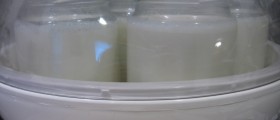
Yogurt is a quick, easy, light, refreshing and delicious food! It can be used along with a complete dish, with a sandwich, cereals, or as a rich nutritious snack. Yogurt is available all the year round made by adding bacterial cultures to milk. The bacteria will trigger the processes in the milk, transforming the milk's sugar, also known as lactose, into lactic acid. This acid gives the yogurt its characteristic refreshing flavor and creamy texture. The word yogurt is derived from the Turkish language where Yoghurmak means, “to thicken”. This fermented diary product is traditionally made by using Lactobacillus bulgaricus and Streptococcus thermophilus cultures. These bacteria, together with the intrinsic healthy properties of milk, make yogurt one of the most beneficial foods.
Health benefits of yogurt
Yogurt is loaded with bacterial cultures that provide fantastic health benefits. Some of the bacteria from yogurt are shown to promote longevity and strengthen the immune system. Regular intake of yogurt is especially beneficial for elderly population since it boosts the immune response and increases the individual’s resistance to various diseases. Elderly people who drink yogurt more than three times per week are more likely to live longer.
This food is also beneficial to women as it may prevent vaginal yeast infections. Yogurt should be used as a part of a therapy for women who have frequent yeast infections. Moreover, it may be equally beneficial for individuals on antibiotics therapy, since it helps to restore the normal bacterial flora in the body.
Lactobacillus casei is known to improve immune response and helps to fight off pneumonia. This bacterium is usually found in great quantities in kefir. Similarly, yogurt provides protection from various infections by viruses, yeasts, and parasites.
Yogurt is shown to improve levels of good cholesterol and lower the levels of bad cholesterol. Adding a daily cup of yogurt can help to improve the cholesterol profile. Yogurt enriched with probiotic bacteria is the best choice.
Yogurt also promotes digestion, regular bowel movements, and it significantly increases fat loss, especially around the waistlines. Frequent use of yogurt can improve the body’s ability to build bones and to prevent osteoporosis.
Nutritional profile of yogurt
Yogurt is a very good source of calcium, phosphorus, riboflavin-vitamin B2 and iodine. It has high quantities of vitamin B12, pantothenic acid-vitamin B5, zinc, potassium, protein and molybdenum. Plain whole milk yogurt contains 9g of protein per one cup. This serving has approximately 245g and 149 calories. Yogurt is a good source of calcium and satisfies about 30 % of recommended daily value for this nutrient.

















Your thoughts on this
Loading...